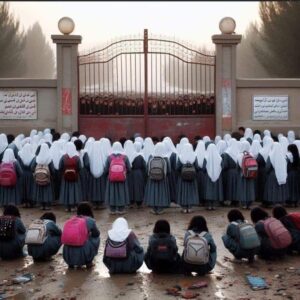Today is the three-year anniversary of Kabul’s fall to the Taliban. As I go about my life in Durham, I cannot help but relive my memories of Afghanistan.
I was born a girl, which many would consider my first sin. Instead of protecting the rights of women as Islam commands, Afghan men forbid girls from studying, attending school, working, or even being outside alone. For women, everything is sin.
I am fortunate. My sisters and I were born into a supportive and intellectual family, thank God, who always believed in us. Despite the teachers who told me it was impossible, my family always supported my dreams, which never changed: I wanted to be a cardiac surgeon.
I went to university. While I studied, violence and suicide attacks continued unceasingly. My sisters survived an explosion behind their university, and while we toiled these terrors never stopped. Yet I persisted, and after six long years of study, I became a doctor. My family, including my brother and my father, were thrilled, even when I told them my dream had not changed. Though women were only traditionally permitted to work as gynecologists, my family never wavered in supporting my dream of being Afghanistan’s first female cardiac doctor.
Around that time, the news reported that a girl named Farkhondeh was martyred by men in Kabul after false claims that she burned the Quran. She was murdered by more than one hundred men in broad daylight. They mutilated her body, dragged her through the streets. When I saw this news, I sobbed. Every time I passed by the scene of this crime, I felt fear, and I mourned her. 
After a month of volunteering at a hospital in Kabul, I was hired and started working in the cardiac surgery department. I was the only female cardiac doctor in all of Afghanistan. I went to work early in the morning and returned home late at night. When I was on duty I stayed up all night, and I never had a day off. I would go to four open-cardiac surgeries in a single day, and during breaks, I would admit patients. I was in the operating room for hours, proving that women can do any job that men can. I proved that women have the strength to do anything they can dream.
The men in my department still tried to discourage me. One day, a colleague of mine said, “If you can do surgery, even a cow can do it.” Everyone laughed. I didn’t say anything. I wanted to cry, yet I continued my work. Later, the hospital celebrated Heart Day. I sat upfront with my coworkers even though they insisted I should sit in the back. I refused to move. I was their colleague, after all. Throughout the program they insulted me. But I knew I was stronger than them and endured silently.
Suicide attacks and explosions increased day by day. When I left for work in the morning I looked back, not believing I would return home alive. They attacked hospitals, mosques, and schools, martyring everyone. They attacked a maternity ward at one of the hospitals, killing mothers during childbirth in the delivery room, even children in their mothers’ wombs. In the holy month of Ramadan they attacked a girls’ school, killing more than 70 innocents.
On August 15, 2021, the Taliban took over Afghanistan. Overnight, all doors were closed for women. The Taliban announced that girls above Grade 6 would no longer be allowed to attend school. I cried that night for the oppressed girls of my country, who saw their dreams die. I was forced to leave my family, my country, my friends, and my duty to the Afghan people. I became a refugee.
Now, three years after the fall of Kabul to the Taliban, conditions for the girls of my country worsen by the day. As women have become increasingly banned from public life and from education and medical access, the abuses suffered by women have worsened more than I could have imagined. This is why I tell our stories, bring awareness to our struggles, and work with Church World Service to elevate the voices of fellow refugees and displaced people. I am a leader for the women of my community, and my desire is to help them find the strength to follow their passions.
I am proof that Afghan women are some of the strongest in the world and deserve to freely live the lives we dream for ourselves.
The author resides in Durham, NC and is an outspoken advocate for women’s rights as she pursues medical licensure in the United States.
